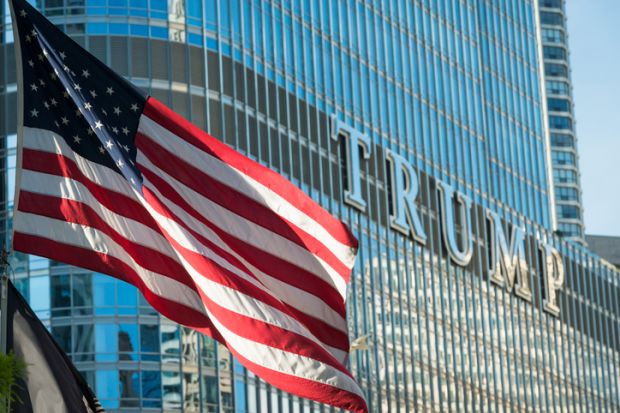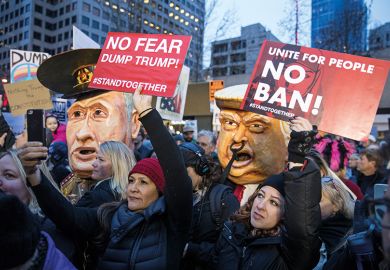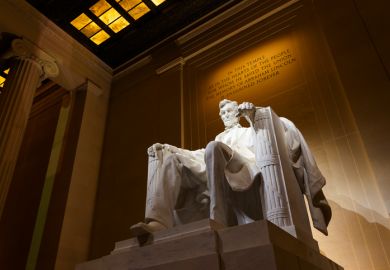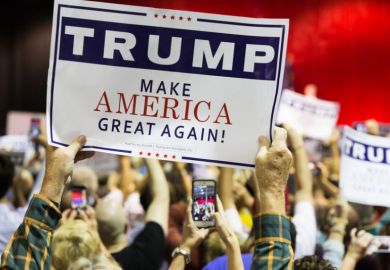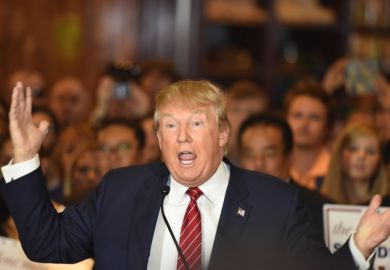More than 4,000 scholars have signed a petition calling for an academic boycott of international conferences held in the US, to provide solidarity with those affected by Donald Trump’s ban on travellers from seven Muslim-majority countries.
The petition questions the “intellectual integrity” of international conferences in the country while the ban persists and “the dialogues they are designed to encourage while Muslim colleagues are explicitly excluded from them”.
It includes signatures from academics from across the world, including Europe, Asia, Australia, Canada, Latin America, Africa and the Middle East.
John Richardson, reader in critical discourse studies at Loughborough University, who signed the petition, told Times Higher Education that it is “important to signal publicly that the situation in America following Trump's election is morally, politically and legally unacceptable”.
He added that his research is on racism and fascism and it would be “indefensible” for him to discuss his research findings “in a context where colleagues who are most directly affected, and can speak from personal experience, are not allowed to be present”.
But some have suggested that the boycott would unfairly harm US universities, while others have claimed that Mr Trump does not care enough about higher education to feel threatened by the ban.
Marina Costin Fuser, PhD candidate in film studies at University of Sussex, said "American universities" should not be "our target".
"Let's be supportive of US universities at times like this. Universities have the potential to encourage critical ideas and organise resistance," she said.
“I don't think Trump cares that much about higher education to actually feel threatened by this conference ban...unless applied hard scientists join in, we'll be boycotting ourselves – that is, departments that lean to the left, such as arts and humanities."
Wickham Clayton, lecturer in film production at the University for the Creative Arts in Farnham said that while it is “absolutely essential” to show solidarity with Muslims and US citizens affected by the ban, it is also important to show solidarity with the US academic community “under fire” from anti-intellectualism.
“Boycotting academic conferences may be leaving academic colleagues out to drift who desperately need support,” he said.
Instead, he suggested that scholars could support and attend academic conferences in the US “with the provision that each conference we support and attend sets aside time to plan or take action” to oppose the bans.
“I truly believe that any kind of boycott would be damaging to academic credibility in the US, and we should create solutions which show solidarity with them as well as the Muslim population targeted by these horrible and illegal orders,” he added.
“While the needs of marginalised Muslim people, and let's face it, anyone not white, is more important than the needs of academics, I'd like to think we are smart, strong, and creative enough to generate solutions that help everyone.”
However, Dr Richardson said such a response “wouldn’t be public”, would only be possible for academics able to enter the US and “doesn't cost academics anything personally”.
“We would still get a line on our CV saying that we had attended an international academic conference,” he said.
Louis Bayham, lecturer in film at the University of Southampton, added that “our first priority has to be with our persecuted colleagues in what is proving to be a perhaps pivotal moment for global humanity”.
Arshin Adib-Moghaddam, professor in global thought and comparative philosophies at Soas, University of London, told THE that he will cancel a lecture tour of the US about his forthcoming book on the current politics of xenophobia and division if “the current situation prevails”.
“I will not expose myself to a belligerent, xenophobic and uneducated political context in the United States. I think this executive order anti-cultural and discriminatory, bordering on racism,” he said.
Register to continue
Why register?
- Registration is free and only takes a moment
- Once registered, you can read 3 articles a month
- Sign up for our newsletter
Subscribe
Or subscribe for unlimited access to:
- Unlimited access to news, views, insights & reviews
- Digital editions
- Digital access to THE’s university and college rankings analysis
Already registered or a current subscriber?
